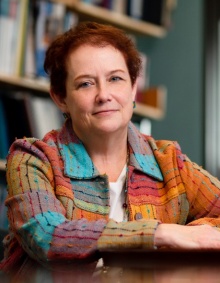Dean's Column
From Dean Nancy J. Smyth

The concept of “social innovation” may puzzle many social workers, who may feel they have been developing innovative social solutions their whole careers. I've learned that only a small percentage of alumni and peers are tracking the far-ranging global social innovation movement, which is often dominated by disciplines having nothing to do with social work.
When our school moved into this arena a few years ago, we sent some faculty to a national social innovation conference; they came back passionately saying, "We have to be in this space. They're working on all of the issues we're concerned about." Another viewpoint they brought back is that many domestic-based social innovation projects could benefit from having the complexity of understanding the social problems that social workers bring to the table.
The world is filled with well-intentioned people offering solutions to social issues. But because the problems are complex, and not just one discipline’s to solve, the path to an effective, sustaining solution is to have social work play a key role at the interdisciplinary table. Our integral participation in interdisciplinary social innovation projects needs to start now.
While all social workers work creatively and collaboratively, we are missing a larger opportunity by not sharing our knowledge, values and perspective with the international and national interdisciplinary spaces where much of social innovation is happening now.
It can be challenging to veer from the path we've taken to explore a cross-disciplinary approach with new partners in new spaces. What does it mean for those with a social work perspective to take a co-design approach to innovation with colleagues in business, engineering or urban planning? How can it be done in a way that also preserves our values and understanding of vulnerable populations?
Assistant Professor Betsy Bowen, featured in this issue, talks about her social innovation journey, that is, moving from healthy skepticism to appreciation for what can be learned from this perspective and in engaging new partners in new spaces. Her story helps us all consider how we might continue to challenge the status quo in new ways.
Nancy J. Smyth, PhD, LCSW